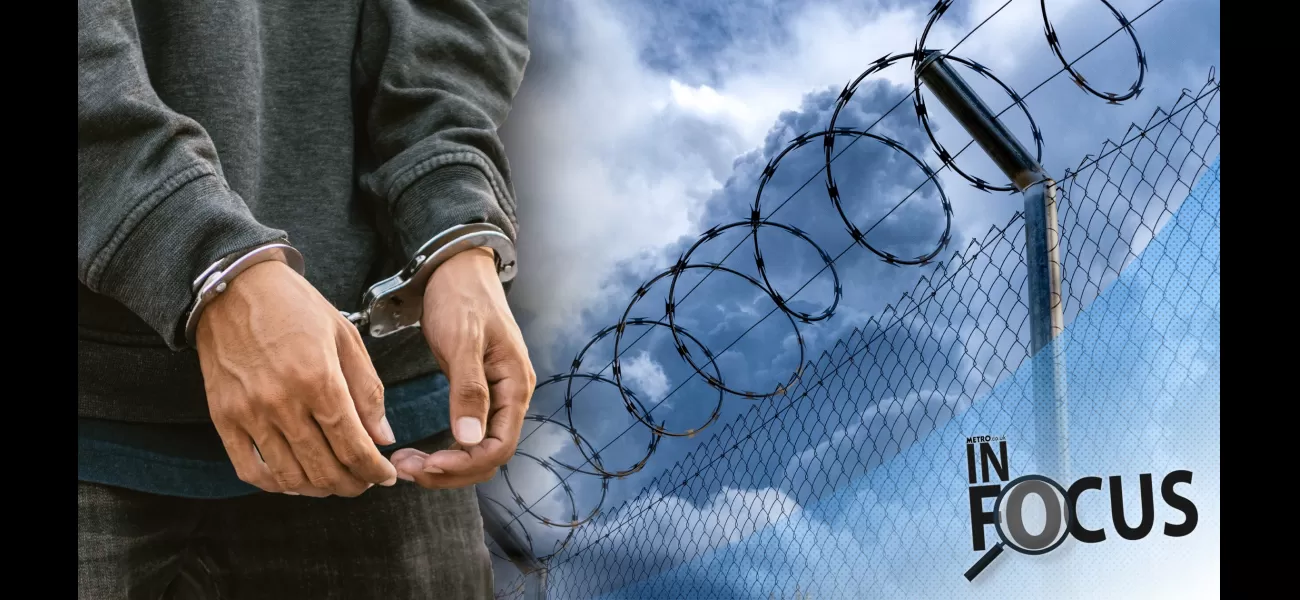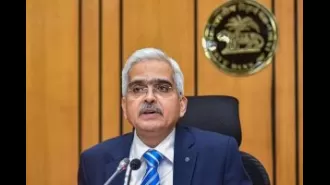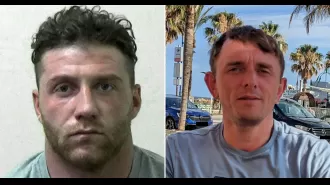99 years in prison - minor offenders imprisoned with no chance of freedom.
They have gone missing, slipped through the cracks.
June 14th 2024.

The Imprisonment for Public Protection sentences have caused immense harm and heartache for countless families, leaving them broken and struggling to cope. One such family is that of Clara White, who hasn't heard her little brother Thomas sing in years. She remembers him as a kind, loving, and musical little boy, but now he is a barefoot and disheveled man, claiming to be Jesus Christ and suffering from psychosis due to paranoid schizophrenia.
Thomas' mental health issues stem from a 12-year prison sentence he received after stealing a phone in Manchester in 2012. It's a shockingly long sentence for such a minor crime, but Thomas has sadly fallen through the cracks of the justice system due to the Imprisonment for Public Protection (IPP) sentence, also known as the 99-year sentence.
These sentences were introduced nearly 20 years ago and could be applied to a wide range of crimes, including non-violent offenses like affray and criminal damage. Over 8,700 people, many of them under 18, were handed these sentences before they were abolished in 2012 following intervention from the European Court of Human Rights. However, there are still 2,796 prisoners detained indefinitely, including Thomas White.
Thomas grew up in Manchester with his three siblings and got involved in petty crime and theft at a young age. However, his sister Clara insists that he was never a violent offender. She vividly remembers the crime that landed him in prison - he was drunk and chatting with two American missionaries when he hugged one and kissed the other on the head before taking their phone. This resulted in a charge of street robbery, which is certainly wrong, but not something that would warrant such a lengthy sentence. Clara asks, "Has he paid his debt to society? Yes. Mentally and physically. He'll never be the same. He's not the brother that I knew."
Thomas is now heavily sedated and spends most of his days in segregation - 23 hours to be exact. He has been transferred to a different prison for the 17th time in 12 years and is now 600 miles away from his family. Clara, now 42, is worried about her brother's well-being and fears that he may harm himself. He refuses to speak to the press, feeling that there is no point. Over the years, he has been moved from one prison to another, with his mental health deteriorating to a point where he is barely recognizable to his sister.
Clara's last visit with Thomas was four years ago, and it was a heartbreaking experience. She was shocked by his appearance - he was wearing too-small shoes with no socks, dirty clothes, and his hair was a mess. He couldn't engage in conversation and just stared at the floor. Clara recalls, "He was a very, very ill man. Something in my brother's mind broke in segregation. There is nothing to progress him."
Since that visit, Clara has been waiting for Thomas' call every day. She worries when she doesn't hear from him and has received some distressing calls, like the time he started speaking in Roman numerals or when other inmates called to say that he was very sick. Last year, the White family commissioned an independent psychiatrist to assess Thomas, and the report concluded that he suffers from paranoid schizophrenia, most likely caused by the IPP sentence. The report recommended that he be transferred to a psychiatric hospital, but unfortunately, he still hasn't been given a bed.
Clara has reached out to local MPs and the Minister for Justice, but her efforts have been in vain. She feels that most people serving IPP sentences are suffering from inhumane and degrading treatment and have been forgotten by the system. She says, "The backlog is so big that they've never seen the light of day. The hopelessness of the situation has been the cause of setting Thomas' mental health off. My brother, to the eyes of everyone involved, isn't a human. He's just an email that goes back and forth. It makes me really angry. A lot of them are very ill, and the government has buried it. It's a human traffic jam, but these are people's lives."
Sadly, Thomas' story is not unique. There are hundreds of stories like his, including 42-year-old Martin, who is still serving an IPP sentence for trying to steal a cigarette in 2006, and 35-year-old Danny, who was only 17 when he was jailed for stealing a phone and was recently released after serving 12 years. Wayne, who got into a fight and was convicted in 2006, has been in prison for 18 years and is still behind bars.
One of the most disturbing aspects of the IPP sentence is the number of people who have died in prison, including 90 who took their own lives. Even former Home Secretary Lord David Blunkett has acknowledged the disaster of IPPs. One such tragic case is that of Londoner Tommy Nicol, who killed himself six years into a four-year sentence, having lost all hope of ever being free. Tommy's sister Donna, who was 18 months younger, remembers him as her best friend growing up. However, by the age of 14, Tommy had started stealing cars and ended up in and out of prison. In 2009, he was sentenced to a four-year IPP sentence for robbery, even though he was out on parole at the time.
Thomas White, a 40-year-old man, has been imprisoned for the past 12 years under the Imprisonment for Public Protection (IPP) sentence. This has had a devastating impact on his family, especially his sister Clara White. She recalls how Thomas used to be a kind and loving little boy who loved to sing, but now he is a disheveled man who claims to be Jesus Christ and is experiencing psychosis due to paranoid schizophrenia.
Thomas' crime, stealing a phone in Manchester in 2012, may seem minor, but he was given a 99-year sentence under the IPP. This type of sentence, introduced 20 years ago, could be applied to 153 different crimes and was handed down to over 8,700 people, including many under the age of 18. Although the IPP was abolished in 2012, there are still 2,796 prisoners, including Thomas, who remain indefinitely detained.
Growing up in Manchester, Thomas got involved in petty crime and theft, but his sister insists that he was never a violent offender. She recalls how he ended up with a street robbery charge after getting drunk and hugging and kissing two American missionaries. Clara believes that Thomas' minor convictions did not warrant such a lengthy sentence and that he has already paid his debt to society both mentally and physically.
Currently, Thomas is heavily sedated and spends most of his time in segregation. He has been transferred to another prison 17 times in the past 12 years, and is now 600 miles away from his family. Clara, now 42, worries about her brother's well-being and believes that he is a danger to himself. She also shares how his mental health has deteriorated to the point where he can no longer engage in conversation.
Clara's last visit to see Thomas was four years ago, and she was shocked by his appearance. He was wearing too-small shoes with no socks, grubby clothes, and had chunks of his hair missing. She believes that the stress of his imprisonment has taken a toll on his body and that he is a very ill man. Since that visit, Clara has been waiting for his daily phone calls, even though some have been disturbing, like when he started speaking in Roman numerals or when other inmates called to say he was sick.
Last year, the White family commissioned an independent psychiatrist to assess Thomas, and the report concluded that he suffers from paranoid schizophrenia, most likely caused by his IPP sentence. Clara has shared this report with local MPs and the Minister for Justice, but Thomas still does not have a hospital bed. She believes that the situation is hopeless and that her brother, like many others on IPPs, has fallen through the cracks.
Sadly, Thomas' story is not unique. There are many others like him, such as Martin, who is still in prison for trying to steal a cigarette in 2006, and Danny, who was 17 when he was jailed for stealing a phone and was only released last year. The 99-year sentence has also resulted in the deaths of many prisoners, including those who have taken their own lives. Former home secretary Lord David Blunkett has acknowledged the disastrous effects of IPPs.
One such tragic case is that of Tommy Nicol, a Londoner who committed suicide after serving six years of a four-year IPP sentence for robbery. His sister Donna, who was his best friend growing up, remembers how he taught her how to ride a bike. However, Tommy's life took a wrong turn when he started stealing cars at the age of 14. He was given an IPP sentence at the age of 37 when he was out on parole.
Thomas' mental health issues stem from a 12-year prison sentence he received after stealing a phone in Manchester in 2012. It's a shockingly long sentence for such a minor crime, but Thomas has sadly fallen through the cracks of the justice system due to the Imprisonment for Public Protection (IPP) sentence, also known as the 99-year sentence.
These sentences were introduced nearly 20 years ago and could be applied to a wide range of crimes, including non-violent offenses like affray and criminal damage. Over 8,700 people, many of them under 18, were handed these sentences before they were abolished in 2012 following intervention from the European Court of Human Rights. However, there are still 2,796 prisoners detained indefinitely, including Thomas White.
Thomas grew up in Manchester with his three siblings and got involved in petty crime and theft at a young age. However, his sister Clara insists that he was never a violent offender. She vividly remembers the crime that landed him in prison - he was drunk and chatting with two American missionaries when he hugged one and kissed the other on the head before taking their phone. This resulted in a charge of street robbery, which is certainly wrong, but not something that would warrant such a lengthy sentence. Clara asks, "Has he paid his debt to society? Yes. Mentally and physically. He'll never be the same. He's not the brother that I knew."
Thomas is now heavily sedated and spends most of his days in segregation - 23 hours to be exact. He has been transferred to a different prison for the 17th time in 12 years and is now 600 miles away from his family. Clara, now 42, is worried about her brother's well-being and fears that he may harm himself. He refuses to speak to the press, feeling that there is no point. Over the years, he has been moved from one prison to another, with his mental health deteriorating to a point where he is barely recognizable to his sister.
Clara's last visit with Thomas was four years ago, and it was a heartbreaking experience. She was shocked by his appearance - he was wearing too-small shoes with no socks, dirty clothes, and his hair was a mess. He couldn't engage in conversation and just stared at the floor. Clara recalls, "He was a very, very ill man. Something in my brother's mind broke in segregation. There is nothing to progress him."
Since that visit, Clara has been waiting for Thomas' call every day. She worries when she doesn't hear from him and has received some distressing calls, like the time he started speaking in Roman numerals or when other inmates called to say that he was very sick. Last year, the White family commissioned an independent psychiatrist to assess Thomas, and the report concluded that he suffers from paranoid schizophrenia, most likely caused by the IPP sentence. The report recommended that he be transferred to a psychiatric hospital, but unfortunately, he still hasn't been given a bed.
Clara has reached out to local MPs and the Minister for Justice, but her efforts have been in vain. She feels that most people serving IPP sentences are suffering from inhumane and degrading treatment and have been forgotten by the system. She says, "The backlog is so big that they've never seen the light of day. The hopelessness of the situation has been the cause of setting Thomas' mental health off. My brother, to the eyes of everyone involved, isn't a human. He's just an email that goes back and forth. It makes me really angry. A lot of them are very ill, and the government has buried it. It's a human traffic jam, but these are people's lives."
Sadly, Thomas' story is not unique. There are hundreds of stories like his, including 42-year-old Martin, who is still serving an IPP sentence for trying to steal a cigarette in 2006, and 35-year-old Danny, who was only 17 when he was jailed for stealing a phone and was recently released after serving 12 years. Wayne, who got into a fight and was convicted in 2006, has been in prison for 18 years and is still behind bars.
One of the most disturbing aspects of the IPP sentence is the number of people who have died in prison, including 90 who took their own lives. Even former Home Secretary Lord David Blunkett has acknowledged the disaster of IPPs. One such tragic case is that of Londoner Tommy Nicol, who killed himself six years into a four-year sentence, having lost all hope of ever being free. Tommy's sister Donna, who was 18 months younger, remembers him as her best friend growing up. However, by the age of 14, Tommy had started stealing cars and ended up in and out of prison. In 2009, he was sentenced to a four-year IPP sentence for robbery, even though he was out on parole at the time.
Thomas White, a 40-year-old man, has been imprisoned for the past 12 years under the Imprisonment for Public Protection (IPP) sentence. This has had a devastating impact on his family, especially his sister Clara White. She recalls how Thomas used to be a kind and loving little boy who loved to sing, but now he is a disheveled man who claims to be Jesus Christ and is experiencing psychosis due to paranoid schizophrenia.
Thomas' crime, stealing a phone in Manchester in 2012, may seem minor, but he was given a 99-year sentence under the IPP. This type of sentence, introduced 20 years ago, could be applied to 153 different crimes and was handed down to over 8,700 people, including many under the age of 18. Although the IPP was abolished in 2012, there are still 2,796 prisoners, including Thomas, who remain indefinitely detained.
Growing up in Manchester, Thomas got involved in petty crime and theft, but his sister insists that he was never a violent offender. She recalls how he ended up with a street robbery charge after getting drunk and hugging and kissing two American missionaries. Clara believes that Thomas' minor convictions did not warrant such a lengthy sentence and that he has already paid his debt to society both mentally and physically.
Currently, Thomas is heavily sedated and spends most of his time in segregation. He has been transferred to another prison 17 times in the past 12 years, and is now 600 miles away from his family. Clara, now 42, worries about her brother's well-being and believes that he is a danger to himself. She also shares how his mental health has deteriorated to the point where he can no longer engage in conversation.
Clara's last visit to see Thomas was four years ago, and she was shocked by his appearance. He was wearing too-small shoes with no socks, grubby clothes, and had chunks of his hair missing. She believes that the stress of his imprisonment has taken a toll on his body and that he is a very ill man. Since that visit, Clara has been waiting for his daily phone calls, even though some have been disturbing, like when he started speaking in Roman numerals or when other inmates called to say he was sick.
Last year, the White family commissioned an independent psychiatrist to assess Thomas, and the report concluded that he suffers from paranoid schizophrenia, most likely caused by his IPP sentence. Clara has shared this report with local MPs and the Minister for Justice, but Thomas still does not have a hospital bed. She believes that the situation is hopeless and that her brother, like many others on IPPs, has fallen through the cracks.
Sadly, Thomas' story is not unique. There are many others like him, such as Martin, who is still in prison for trying to steal a cigarette in 2006, and Danny, who was 17 when he was jailed for stealing a phone and was only released last year. The 99-year sentence has also resulted in the deaths of many prisoners, including those who have taken their own lives. Former home secretary Lord David Blunkett has acknowledged the disastrous effects of IPPs.
One such tragic case is that of Tommy Nicol, a Londoner who committed suicide after serving six years of a four-year IPP sentence for robbery. His sister Donna, who was his best friend growing up, remembers how he taught her how to ride a bike. However, Tommy's life took a wrong turn when he started stealing cars at the age of 14. He was given an IPP sentence at the age of 37 when he was out on parole.
[This article has been trending online recently and has been generated with AI. Your feed is customized.]
[Generative AI is experimental.]
0
0
Submit Comment





